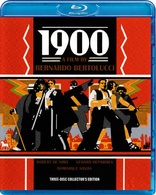1900 Blu-ray Movie
Home1900 Blu-ray Movie 
Novecento | Three-Disc Collector's EditionOlive Films | 1976 | 317 min | Unrated | May 15, 2012
Movie rating
7.3 | / 10 |
Blu-ray rating
| Users | 0.0 | |
| Reviewer | 4.0 | |
| Overall | 4.0 |
Overview
1900 (1976)
The fates of two childhood friends born on the same day in 1901 at opposite ends of the social scale through five decades of class struggle.
Starring: Robert De Niro, Gérard Depardieu, Dominique Sanda, Francesca Bertini, Laura BettiDirector: Bernardo Bertolucci
| Drama | 100% |
| Foreign | 84% |
| History | 22% |
| Melodrama | 14% |
Specifications
Video
Video codec: MPEG-4 AVC
Video resolution: 1080p
Aspect ratio: 1.78:1
Original aspect ratio: 1.85:1
Audio
English: DTS-HD Master Audio 2.0
Italian: DTS-HD Master Audio Mono
French: DTS-HD Master Audio Mono
Subtitles
English
Discs
50GB Blu-ray Disc
Three-disc set (2 BDs, 1 DVD)
Playback
Region free
Review
Rating summary
| Movie | 4.5 | |
| Video | 4.0 | |
| Audio | 4.0 | |
| Extras | 3.0 | |
| Overall | 4.0 |
1900 Blu-ray Movie Review
It was actually ottocento when this thing began.
Reviewed by Jeffrey Kauffman April 28, 2012It may be hard for those born in the Baby Boomer or Generation X eras to realize, but there was a time when Communism was cool. Even (and perhaps especially) American Communism had a sway over the intelligentsia and artistic class that was profound and keenly felt, at least in the decades before World War II. Even in the grips of the worst recession most of us alive have ever known, it’s next to impossible to understand the calamitous economic conditions that beset America and the rest of the world during the thirties, a time that saw a real rise in the popularity of two competing ideologies which sought to combat the perceived failures of Capitalism: namely, Communism and Fascism. While the ostensible errors of Capitalism were seen as contributing mightily to the worldwide Depression then enveloping the globe, there were two somewhat linked, yet rather drastically different, approaches in dealing with the so-called problem. Both of these approaches advocated a centralized power, an absolute dictatorship, but while Communism at least ostensibly aggrandized the force of the collective (though of course in reality there was a much different state of affairs), Fascism was pure, unadulterated top down totalitarian leadership that exerted its authority without much regard for the “little people”, even while, like in the case of Communism, it claimed to be all about the “folk”. In a situation of the lesser of three evils, it’s little wonder, then, that Communism providing such an apparently appealing alternative for so many people, including a wide swath of the American cultural elite. Italy has had its own contentious history with both Communism and Fascism, and the interplay between the two ideologies plays an important role in one of Bernardo Bertolucci’s most celebrated films, Novecento (literally “nine hundred” but meaning here the 20th century, translated as 1900 for domestic American release). This is a film with a troubled release history and an equally turbulent critical reception, but part of the negative critical reaction to the film upon its initial release was based on the fact that it had been heavily edited. While some notables like Roger Ebert shuddered to even consider what the film would look like even longer than it was in its first release, there’s no denying the slow accretion of power and impact the original director’s cut of 1900 amasses over its more than five hour length (yes, you read that right—more than five hours).
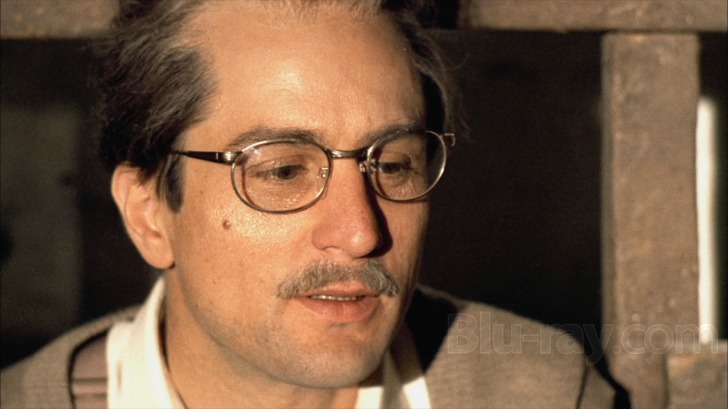
Novecento is an audacious film, one that is not especially subtle in its socioeconomic messaging, but one with a rare provocative power, often unforgettable in its scope and impact. Novecento is also a film that has the hubris to take one of the hoariest film clichés of all time—two friends born on opposite sides of the tracks whose lives intersect in increasingly complex ways—to weave a positively operatic saga that attempts to take on seemingly every major movement of Italian society in the dawning decades of the twentieth century. Huge and admittedly undisciplined, Novecento is still one of the most bracing film experiences of its era, and quite probably well beyond. It may be a film that does indeed invite eye rolling from time to time, but that tendency is within an overall context of eyes wide open in awe and amazement.
The film is a multi-generational tale, almost like the American films culled from Edna Ferber novels which were so popular in the mid-twentieth century, and it begins with the birth of two boys on January 1, 1900. One of them is the grandson of wealthy padrone Alfredo (Burt Lancaster, in a somewhat similar role to his work in Visconti’s The Leopard), and the other is the bastard grandson of the estate’s foreman (Sterling Hayden). The two boys, Alfredo and Olmo, grow into manhood over the first half or so of the film, ultimately being played by Robert De Niro and Gerard Depardieu (and those of you who have only experienced the latter day "heftier" Depardieu may well not even recognize the relatively buff young man on display here). The first section of Novecento is a largely lyrical exploration of the joys of boyhood on a huge Italian estate, albeit one with the roiling undercurrent of tensions between Alfredo and Olmo slowly developing due to Alfredo’s patrician upbringing and Olmo’s collectivist one. Later added into this mix is the third central character of Novecento, a new foreman with the appropriate name of Attila (Donald Sutherland), a vicious brute who becomes a fascist blackshirt as Mussolini’s regime spreads its cancerous tentacles across the nation.
It is indeed as various belief systems become more codified, perhaps around the 1920s or so, when Novecento enters its most screed-like moments. Alfredo ends up marrying a headstrong young woman named Ada (Dominique Sanda) whose disappointment in her marriage leads her to drink. Olmo’s life is met with some despair and disillusionment, especially after his wife dies, but the two longtime friends are bound together by their shared love of the land, if simultaneously torn asunder by their political leanings. Attila’s increasingly vicious activity spills into both of the men’s lives, and some of Novecento’s most disturbing moments come at the hands (literally) of this unsettling fascist character. Some have decried Bertolucci’s supposed lack of clarity in dealing with some of the political ramifications of these characters, notably Attila, but there’s little doubt about the visceral impact that is generated by at least one major sequence which reveals what a disgusting character Attila is.
This unexpurgated version of Novecento has some very provocative (and in some cases troubling) imagery and sequences which were excised from various edited versions that have made the rounds through the years. These include a couple of pretty violently graphic deaths, and a celebrated ménage a trois with Alfredo, Olmo and a village girl (with full frontal nudity from De Niro and Depardieu) which ends with an unsettling epileptic seizure. The film is cast as a flashback of sorts, starting with the end of World War II, and then drifting back to the births of the boys, and then moving forward chronologically, with a somewhat ambiguous coda tacked on the end with Alfredo and Olmo as elderly men, still involved in a rancorous dispute (which only partially masks their abiding love for one another) that Bertolucci seems to suggest is part of the Italian Soul. Bertolucci really makes no bones about his operatic ambitions for Novecento, and in fact the main arc of the story is set in place when the estate’s hunchbacked worker (not so subtly named Rigoletto) wanders drunkenly through the forest sadly proclaiming the death of Verdi.
There’s no denying that this full version of Novecento is often ungainly, sprawling, and at times unfocused, but it’s also unusually captivating, building character brilliantly over time while opening a window on the competing political ideologies that held sway in Italy over the course of several decades. Like Italy itself, Novecento is boisterous and a bit wild, but, again like Italy, it’s absolutely unforgettable. Bertolucci had burst upon the scene in a major way with The Conformist and The Spider’s Stratagem and then went on to international fame (some would say infamy) with Last Tango in Paris, and there’s absolutely no doubt that renown gave him carte blanche to do pretty much as he willed with Novecento. Some claimed at the time his efforts were akin to another hubristic disaster which would follow some four years after Novecento’s 1976 debut, Heaven’s Gate, but experiencing Novecento now, especially in this original cut, is like visiting a fine wine that has only grown in body and nuance with age. Novecento is by no means a perfect film, and its extreme length may be off putting for some, but for those with the patience and fortitude to experience the huge panoply of life Bertolucci offers in this film, there’s really very little to compare this film to. It’s a thrillingly unique experience that every film lover should have at least once in their lives.
1900 Blu-ray Movie, Video Quality 
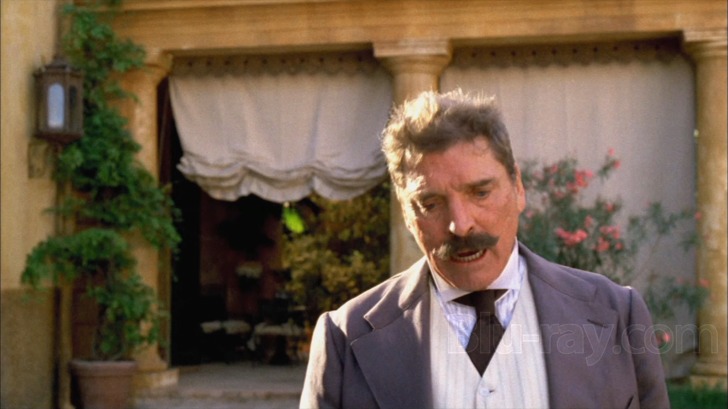
Novecento is presented on Blu-ray courtesy of Olive Films with an AVC encoded 1080p transfer in 1.78:1. Bertolucci and his cinematographer Vittorio Storaro paint with light throughout this film, using seasonal changes as counterpoint to the interior life of the characters, and some of the mist strewn sylvan settings may lead some to believe this transfer is overly soft, but it isn't for the most part. This will in fact be something of a minor revelation for those who have seen Novecento only in a number of at least relatively substandard home video releases through the years, many of which were extremely poorly color timed. The overall image here is crisp and precise (with certain exceptions, noted below) with some very appealing fine detail in close-ups. Color is accurate, appropriately robust in some of the autumnal scenes but almost desaturated at other points, intentionally so. Some midrange shots, especially those capturing wide vistas out of doors, have a relatively softer appearance than the bulk of the film. As with most HD masters provided to Olive, there has been little to no digital tweaking of the source elements, and so natural film grain is completely intact, as are a few very minor blemishes, something rather negligible given the film's extreme length, and generally speaking this retains a beautifully natural cinematic appearance that very accurately recreates a mid-seventies film look. Some of this film is almost like a Breugel painting come to life, with peasants working in honey colored wheat fields with crimson-orange skies bleeding in the background, and this high definition presentation offers it all rather beautifully. About the only complaints some videophiles may have is due to some slightly inconsistent contrast, which seems to lurch just a bit erratically from interior to exterior shots, and some resultant murkiness of shadow detail in a couple of very dimly lit sequences.
1900 Blu-ray Movie, Audio Quality 
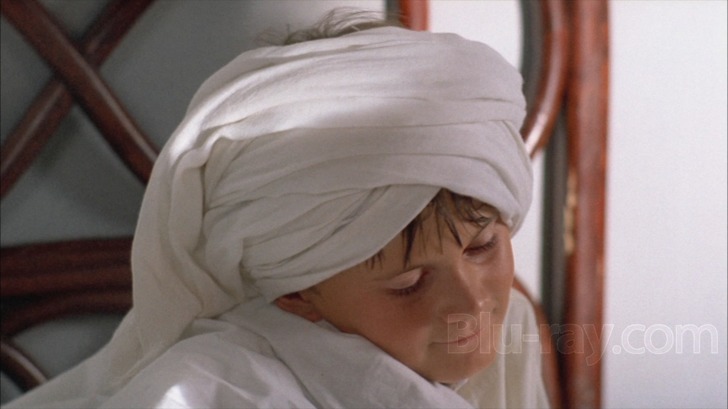
Novecento features three lossless audio options, an English language track in DTS-HD Master Audio 2.0, and two DTS-HD Master Audio Mono mixes, one in Italian and one in French. As with many multi-national productions, actors seem to have spoken in their native languages, so the "big" American stars like Lancaster, Hayden, De Niro and Sutherland speak English, but it also appears that Depardieu and Sanda did as well. Several other characters are obviously dubbed, though there's no horrible difference in reverb or general ambience with regard to these looped elements and the bulk of the soundtrack. (It doesn't appear that Novecento was filmed silently and entirely post-looped, as was the custom in the Italian film industry well into the seventies.) The soundstage here is fairly narrow even in the 2.0 mix, but fidelity is strong, and dialogue, effects and Ennio Morricone's elegantly elegiac score are all presented cleanly and clearly.
1900 Blu-ray Movie, Special Features and Extras 

Neither of the two Blu-ray discs which contain the main feature offer any supplements, but a bonus DVD includes:
- Bernardo Bertolucci: Reflections on Cinema (SD; 51:46) is a fascinating documentary featuring copious interviews with Bertolucci, where he delves into why moviemaking is so important to him (he mentions it helps him bring order to the chaotic), as well as his long history in the Italian film industry which ultimately led to his international prominence. There is some incredibly great archival footage here, some dating back at least to the early sixties, which help put Bertolucci in the context of the young Italian filmmakers who followed in the wake of the Neorealist movement. There is also some great footage of Bertolucci on location and on the sets of various films of his, in director mode.
- Essay. This text based supplement gives some background on Bernardo Bertolucci: Reflections on Cinema (though whoever put this together didn't proofread very carefully—they list the director's first name as Bernando).
1900 Blu-ray Movie, Overall Score and Recommendation 
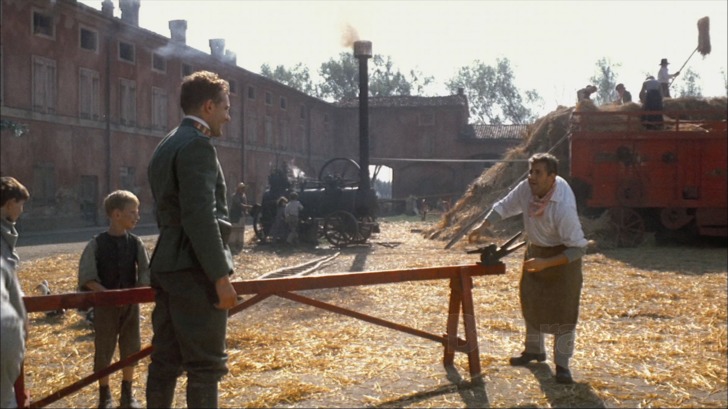
Novecento is not for the faint of heart, on any number of levels. First of all, it's an incredibly long film and it requires a certain amount of patience. Second of all, it has some extremely troubling elements that are at the very least unsettling. Third of all, there's simply no denying that the film is wild and unfocused at times, which, as with its length, requires a certain amount of patience. But even with these caveats, Novecento is an incredibly visceral experience, breathtakingly beautiful and stunningly brutal in almost equal amounts. I first saw Novecento when I was still a teenager in one of its drastically edited forms at a little art house that played second run films, and the experience has stayed with me for a lifetime. Seeing this unedited version now in high definition is like revisiting a slightly tattered old novel that hasn't been read in years—it's weathered, but it's still full of incredibly vivid characters and situations. This new Blu-ray offers solid video and audio and it contains a remarkably fascinating bonus documentary on the included DVD. Highly recommended.
Similar titles
Similar titles you might also like

The Conformist
Il Conformista | 4K Restoration
1970

Umberto D.
1952

Cemetery of Splendor
2015

The Leopard
Il gattopardo
1963

Goodbye to Language 3D
Adieu au langage
2014

The Image Book
Le livre d'image
2018

Che: Part One
2008

Jules and Jim
Jules et Jim
1962

La Grande Illusion
Grand Illusion
1937

Baarìa
2009

Vivre sa vie
Vivre sa vie: Film en douze tableaux / My Life to Live
1962

Léon Morin, Priest
Léon Morin, prêtre
1961

Burning
버닝 / Beoning
2018

Cinema Paradiso 4K
Nuovo Cinema Paradiso 4K | Director's cut on BD | Arrow Academy | Special Edition
1988

Roma
2018

The Hunt
Jagten
2012

The Moment of Truth
Il momento della verità
1965

Before the Revolution
Prima della rivoluzione
1964

City of God
Cidade de Deus
2002

Wrong Move
Falsche Bewegung
1975
